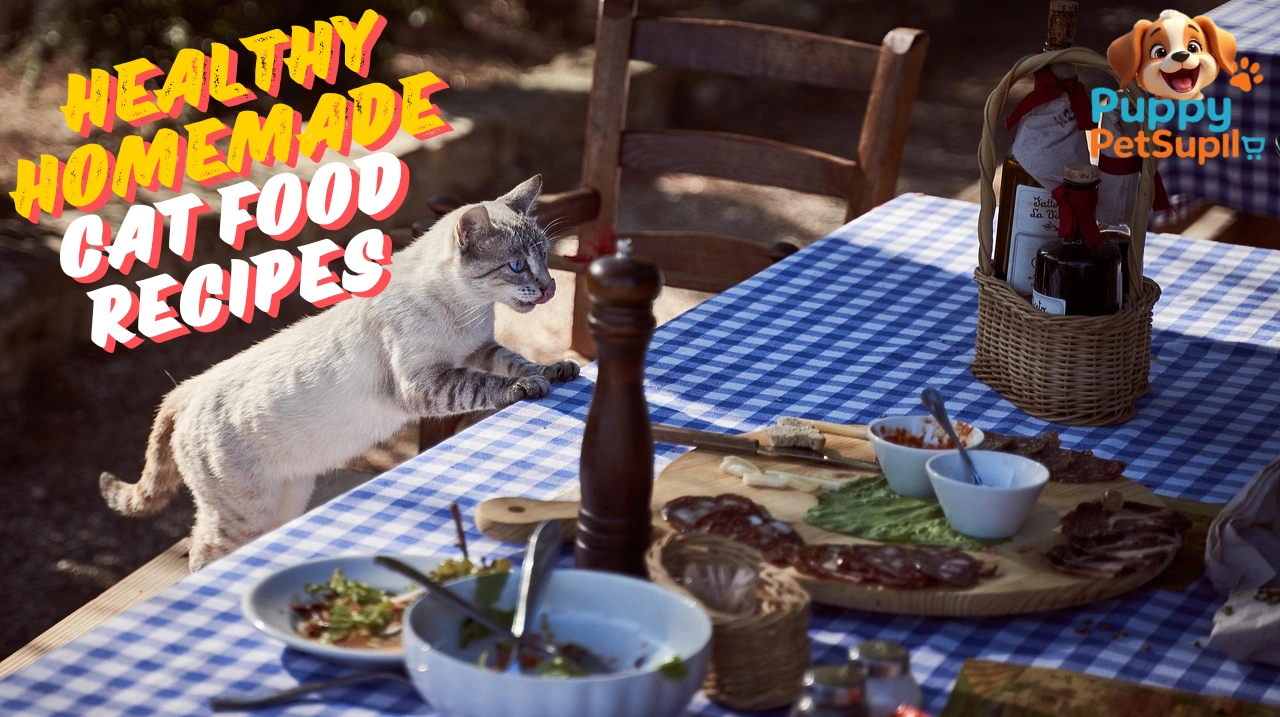Did you know that 60% of cats in the US are overweight? This can lead to diabetes and heart disease. Making
homemade cat food lets you control what your pet eats. It ensures they get the nutrients they need for good health.

Healthy homemade cat food recipes
Knowing what your cat needs and trying diy pet food can help. You can make a diet that keeps your pet healthy. This article will show you how to make healthy homemade cat food recipes. It also offers tips for a balanced pet diet.
Key Takeaways
- Understand your cat’s nutritional needs to create a personalized diet.
- Explore diy pet food options to promote overall health.
- Maintain a balanced pet diet to prevent health issues.
- Discover the benefits of natural cat food and organic pet food.
- Learn how to create healthy homemade cat treats.
Understanding Your Cat’s Nutritional Needs
As a cat owner, knowing what nutrients your cat needs is key. Cats must eat a diet rich in protein from animal sources. This is vital for their health and wellbeing.

cat nutrition
Essential Nutrients for Feline Health
Cats need essential nutrients like taurine, vitamins, and minerals. Taurine, found in animal proteins, is key for heart health and vision. Vitamins and minerals help with energy and fighting off sickness.
The Importance of Protein in Cat Diets
Protein is vital for a cat’s diet. It helps build and repair their bodies. Foods like chicken, salmon, or beef are best for muscle health. Without enough protein, cats can lose weight and have poor fur.
Nutrients to Avoid in Cat Food
It’s also important to know what to avoid in cat food. Too many carbs and fillers can harm a cat. They can cause obesity, diabetes, and other issues. A balanced diet is essential for your cat’s health.
Benefits of Making Your Own Cat Food
Creating your own cat food at home can greatly improve your cat’s health. You can pick the ingredients, ensuring your cat gets the nutrients they need. This way, you avoid fillers or by-products they don’t need.
Quality Control and Ingredient Awareness
When you make your cat’s food, you choose the best ingredients. You skip preservatives and additives found in store bought cat food. Remember, cats are like us, and their food should be healthy and nutritious.

benefits of homemade cat food
Cost-Effectiveness Over Time
While it might cost more at first, making your cat’s food can save money in the long run. Buying ingredients in bulk and making meals ahead of time can cut costs.
Addressing Specific Health Concerns
Homemade cat food lets you tailor meals for health issues like food sensitivities or allergies. By changing ingredients, you can help your cat feel better and live healthier.
As a cat owner, making smart choices about your pet’s diet can make them happier and healthier.
Essential Equipment and Ingredients
Making homemade cat food is easy with the right tools and ingredients. You’ll need to know what’s essential for healthy meals for your cat.
Kitchen Tools You’ll Need
You’ll need basic kitchen tools to make homemade cat food. These include:
- A meat grinder or food processor to grind meats and mix ingredients
- A large pot for cooking
- A cutting board for preparing ingredients
- Measuring cups and spoons for accurate ingredient measurement

homemade cat food ingredients
Core Ingredients for Cat Food
The main ingredients for homemade cat food are high-quality proteins and some veggies and grains. Some key ingredients are:
- Lean meats such as chicken or turkey
- Fish like salmon or cod
- Vegetables such as sweet potatoes or green beans
Supplements and Additives
Some supplements can make your cat’s food even better. These include:
- Omega-3 fatty acids for skin and coat health
- Probiotics for digestive health
- Vitamin supplements to ensure balanced nutrition
Always talk to your vet before adding supplements to your cat’s diet.
Healthy Homemade Cat Food Recipes
Creating your own cat food is easy with the right ingredients. It lets you tailor the diet to your cat’s needs. This ensures they get the best nutrition.
Chicken and Liver Recipe
This recipe is full of protein and nutrients. It’s easy to make and can be adjusted for your cat’s taste and health.
Ingredients
- 1 pound boneless, skinless chicken breast or thighs
- 1/2 cup chicken liver
- 1/4 cup finely chopped carrots
- 1 tablespoon flaxseed oil
- 1 teaspoon dried kelp powder (optional)
Preparation Steps
- Cook the chicken and liver thoroughly.
- Mix in the chopped carrots and flaxseed oil.
- If using kelp powder, sprinkle it on top.
- Serve at room temperature or refrigerate for later use.
Turkey and Fish Blend
This blend is a hit with cats. It offers a mix of flavors and textures. It’s also good for a varied diet.
Ingredients
- 1 pound ground turkey
- 1/2 cup cooked fish (such as salmon or cod)
- 1 egg
- 1 tablespoon olive oil
- 1 teaspoon finely chopped parsley
Preparation Steps
- Cook the ground turkey until it’s fully browned.
- Mix in the cooked fish, egg, and olive oil.
- Sprinkle chopped parsley on top.
- Serve fresh or store in the refrigerator.
Beef and Organ Meat Mix
This mix is full of nutrients. It’s a great addition to your cat’s meals.
Ingredients
- 1 pound ground beef
- 1/2 cup beef liver or kidney
- 1/4 cup finely chopped sweet potatoes
- 1 tablespoon coconut oil
Preparation Steps
- Cook the ground beef and organ meat until fully cooked.
- Mix in the chopped sweet potatoes and coconut oil.
- Serve warm or let it cool before refrigerating.
Here’s a summary of the nutritional content of these recipes:
| Recipe | Protein Content | Fat Content | Carbohydrates |
| Chicken and Liver | 35% | 25% | 5% |
| Turkey and Fish Blend | 30% | 20% | 10% |
| Beef and Organ Meat Mix | 40% | 30% | 5% |
Homemade Cat Treats and Snacks
Making your own cat treats at home lets you pick the ingredients. It’s a fun way to give your cat healthy, tasty snacks.
Tuna Treats
Tuna is a hit with many cats, making it great for homemade treats. You’ll need canned tuna, whole wheat flour, and eggs. Mix these, shape into forms, and bake until they’re crispy.
- 1 can of tuna
- 1 cup whole wheat flour
- 1 egg
Chicken Jerky Bites
Chicken jerky is a protein-packed treat cats enjoy. To make it, slice chicken breast thinly, season with safe herbs, and bake until it’s dry and chewy.
- Slice chicken breast into thin strips
- Season with cat-safe herbs
- Bake until dry and chewy
Catnip Crunchies
For cats that adore catnip, making treats with it is a fun treat. Mix dried catnip with flour, eggs, and water to make dough. Roll it out, cut into shapes, and bake.
Tips: Always talk to your vet before adding new foods or treats to your cat’s diet. This is important if they have allergies or sensitivities.
Safety Considerations and Best Practices
Keeping your cat safe while feeding them homemade food is important. You need to know the key safety tips and best practices. When switching to homemade food, it’s vital to be aware of the risks and how to avoid them.
When to Consult Your Veterinarian
Always talk to a vet before changing your cat’s diet. They can guide you on the best food for your cat’s age, health, and needs. As “Your veterinarian is your best resource for guidance on creating a balanced and safe homemade cat food recipe.”
Potential Risks of Homemade Diets
Homemade cat food can be healthy, but there are risks. These include not getting enough nutrients, contamination, and using harmful ingredients. To avoid these, use top quality ingredients and follow a balanced recipe.
Transitioning Your Cat to Homemade Food
When switching to homemade food, do it slowly to avoid stomach problems. Start by adding a little homemade food to their regular diet. Then, slowly increase the homemade food amount over time. As the American Animal Hospital Association suggests,
“A gradual transition to a new diet can help minimize the risk of gastrointestinal upset.”
By following these safety tips and best practices, you can make sure your cat’s homemade diet is safe and healthy.
Conclusion
Making healthy homemade cat food is rewarding. It offers many health benefits for your cat. You can create a balanced diet that supports their health and happiness.
Homemade cat food improves digestion and makes their coat shiny. With the right recipes and tips, you can manage your cat’s diet. This approach can lead to a longer, healthier life for your pet.
When making homemade cat food, always check with your vet. They can help ensure your cat’s diet meets their needs. With some planning and creativity, you can give your cat food that’s just right for them.
FAQ
Cats need a diet full of protein, essential fatty acids, vitamins, and minerals. Taurine, vitamin A, and arachidonic acid are key. They help with heart health, vision, and skin.
To make sure your cat’s food is balanced, talk to a vet or a certified animal nutritionist. They can help you make a diet plan that fits your cat’s needs.
Yes, some ingredients are bad for cats. Avoid onions, garlic, chocolate, grapes, and raisins. Also, skip foods with xylitol. And be careful with fish like tuna that has too much mercury.
Yes, homemade food can help with health problems like allergies. Talk to your vet to figure out the best diet for your cat’s health issues.
To switch to homemade food, start by mixing a little homemade food with their old food. Slowly add more homemade food over 7-10 days. Watch your cat’s health and adjust as needed.
Yes, homemade food can have risks like not having enough nutrients. To avoid this, talk to a vet or a certified animal nutritionist. They can make sure your recipe is balanced and complete.
Yes, you can make healthy treats for your cat. Use tuna, chicken, and catnip. These treats are a great way to reward your cat and give them a nutritious snack, as long as they’re made with safe ingredients.
Keep homemade cat food in airtight containers in the fridge for 3-5 days. Or freeze it for longer. Always label containers with the date and what’s inside. Follow safe handling to avoid contamination.
